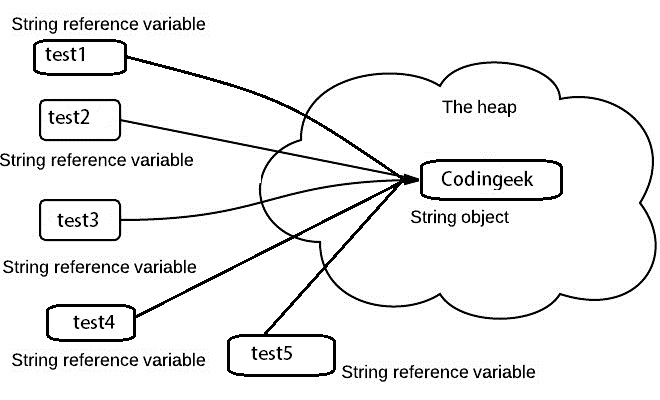Why Are Strings Immutable in Java? Best Practices and Usage Cases
Why Are Strings Immutable in Java? Best Practices and Usage Cases
Blog Article
What Is Unalterable Strings and Exactly How It Works
In the world of shows, understanding the idea of immutable strings is paramount for developing robust and safe applications. Immutable strings refer to strings that can not be modified after they are created, ensuring data integrity and predictability within the code.
The Essentials of Immutable Strings
Immutable strings, as a fundamental concept in shows, are personality series that can not be changed as soon as they are created. This means that once a string is assigned a value, that value can not be modified. In languages like Python and Java, strings are unalterable things, leading to various effects in regards to memory monitoring and information honesty.
Among the vital benefits of unalterable strings is that they offer a complacency in information manipulation. Given that the content of an unalterable string can not be modified, it makes sure that the original information remains intact, minimizing the threat of unintended changes during program implementation (Why are strings immutable in Java?). This home also simplifies debugging processes, as programmers can rely on that once a string is defined, its worth will certainly not be accidentally changed
Additionally, unalterable strings help with effective memory usage. When a new string is produced based upon an existing one, as opposed to modifying the original string, the new value is saved individually. This approach improves efficiency by reducing memory fragmentation and simplifying memory allocation processes. Overall, recognizing the essentials of unalterable strings is critical for grasping programs ideas and optimizing code efficiency.
Advantages of Unalterable Strings
Structure upon the safety and effectiveness benefits of immutable strings, their advantages encompass boosting code integrity and simplifying simultaneous programming tasks. By being unalterable, strings can not be modified after development, which eliminates the risk of unplanned changes in the data they save. This integral immutability makes certain that when a string is produced, its value remains consistent throughout the program's execution, reducing the opportunities of pests brought on by unanticipated modifications.
Furthermore, immutable strings add to code reliability by making it simpler to reason about the state of a program. Since strings can not be transformed, designers can trust that a string will certainly always hold the very same worth, simplifying debugging and maintenance initiatives. This predictability leads to much more reliable and secure codebases.

Execution in Programming Languages
Within various programming languages, the consolidation of unalterable strings is a basic aspect that influences how data is managed and controlled within code frameworks. The application of unalterable strings varies throughout various shows languages, with each language providing its own devices to support this principle.

On the other hand, languages like C and C++ do not have integrated support for unalterable strings. Designers in these languages have to by hand apply immutability by imposing regulations within their code to stop direct adjustments to string things.
Best Practices for Functioning With Immutable Strings
When taking care of immutable strings in programs languages like Java and Python, sticking to best methods ensures reliable and secure information adjustment. Among the crucial ideal practices is to use StringBuilder or StringBuffer instead of directly adjusting strings, particularly when handling substantial concatenation procedures. These classes give mutable alternatives for string control, assisting to prevent unneeded memory allotments and improving performance.
One more finest technique is to make use of string interpolation or formatting works supplied by the language as opposed to hand-operated concatenation. This not just boosts readability but likewise aids in avoiding usual challenges such as unintentional string alterations. Additionally, when collaborating with delicate data such as passwords or API secrets, it is critical to stay clear of keeping them as plain message in immutable strings. Using protected storage mechanisms like char ranges or specialized libraries for handling delicate info helps minimize security threats related to unalterable strings.
Real-world Applications and Instances
Checking out practical applications of Website immutable strings in numerous industries exposes their substantial influence on information stability and system dependability. In the health care sector, immutable strings play an important function in making certain the safety and security and privacy of patient data. By protecting against unapproved modifications to sensitive details such as medical documents and prescriptions, immutable strings help maintain compliance with strict personal privacy laws like HIPAA.
Financial establishments additionally benefit from the unalterable nature of strings to improve the security of client information and purchase records. Unalterable strings aid stop fraudulence and unapproved modifications to financial details, giving a robust protection versus cyber hazards and guaranteeing the count on and self-confidence of clients.

Conclusion
Ideal techniques for functioning with immutable strings consist of preventing direct alterations and using approaches that return new string things. Real-world applications of unalterable strings consist of information file encryption, caching, and string manipulation tasks.
Unalterable strings refer to strings that can not be changed after they are produced, ensuring data stability and predictability within the code. When a brand-new string is developed based on an existing one, instead than changing the original string, the new worth is stored separately.In languages like Java and Python, strings are unalterable by default, indicating that when a string item is created, its worth can not be transformed - Why are strings immutable in Java?. Ideal practices for working with immutable strings consist of preventing direct alterations and using methods that return brand-new string items. Real-world applications of immutable strings consist of information file encryption, caching, and string adjustment tasks
Report this page